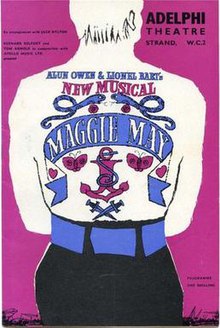Stanley Bootle, known as Stan Kelly-Bootle, was a British author, academic, singer-songwriter and computer scientist.
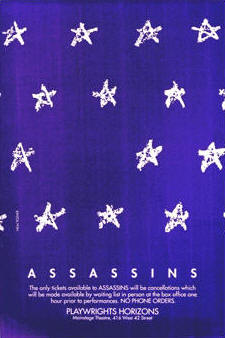
Assassins is a musical with music and lyrics by Stephen Sondheim and a book by John Weidman, based on an original concept by Charles Gilbert Jr.

Brigadoon is a musical with a book and lyrics by Alan Jay Lerner, and music by Frederick Loewe. The song "Almost Like Being in Love", from the musical, has become a standard. It features two American tourists who stumble upon Brigadoon, a mysterious Scottish village that appears for only one day every 100 years. Tommy, one of the tourists, falls in love with Fiona, a young woman from Brigadoon.

Oliver! is a coming-of-age stage musical, with book, music and lyrics by Lionel Bart. The musical is based upon the 1838 novel Oliver Twist by Charles Dickens.

Lionel Bart was a British writer and composer of pop music and musicals. He wrote Tommy Steele's "Rock with the Caveman" and was the sole creator of the musical Oliver! (1960). With Oliver! and his work alongside theatre director Joan Littlewood at Theatre Royal, Stratford East, he played an instrumental role in the 1960s birth of the British musical theatre scene after an era when American musicals had dominated the West End.
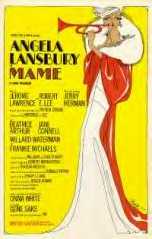
Mame is a musical with the book by Jerome Lawrence and Robert Edwin Lee and music and lyrics by Jerry Herman. Originally titled My Best Girl, it is based on the 1955 novel Auntie Mame by Patrick Dennis and the 1956 Broadway play by Lawrence and Lee. A period piece set in New York City and spanning the Great Depression and World War II, it focuses on eccentric bohemian Mame Dennis, whose famous motto is "Life is a banquet and most poor sons of bitches are starving to death." Her fabulous life with her wealthy friends is interrupted when the young son of her late brother arrives to live with her. They cope with the Depression in a series of adventures.

Silk Stockings is a musical with a book by George S. Kaufman, Leueen MacGrath, and Abe Burrows and music and lyrics by Cole Porter. The musical is loosely based on the Melchior Lengyel story Ninotchka and the 1939 film adaptation it inspired. It ran on Broadway in 1955. This was the last musical that Porter wrote for the stage.
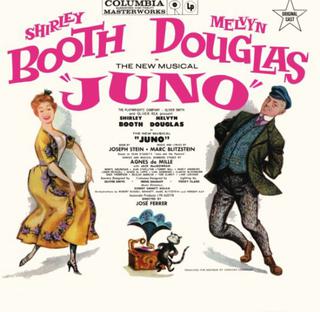
Juno is a musical with music and lyrics by Marc Blitzstein and book by Joseph Stein, based closely on the 1924 play Juno and the Paycock by Seán O'Casey. The story centers on the disintegration of an Irish family in Dublin in the early 1920s, during the Irish War of Independence. Juno is a hardworking matriarch who strives to hold her family together in the face of war, betrayal, and her worthless husband's drinking.
Alan-a-Dale is a figure in the Robin Hood legend. According to the stories, he was a wandering minstrel who became a member of Robin's band of outlaws, the "Merry Men".
Myths and Hymns is a song cycle by composer Adam Guettel, based on Greek myth and lyrics found in an antique hymnal.

Blitz! is a musical by Lionel Bart. The musical, described by Steven Suskin as "massive", was set in the East End of London during the Blitz. The story drew on Bart's childhood memories of London's Jewish East End during the Blitz and, like most musicals, centred on a romance between a young couple, in this case a Jewish woman and a Cockney man, although the largest role and main point-of-view character is that of Mrs Blitztein, the young woman's mother. Steven Suskin describes it as "Abie's Irish Rose set against the burning of Atlanta." Bart himself described the play as "…three human stories inside an epic canvas; the major human conflict – the major plot – personifies the spirit of London and how that spirit developed during the period of the piece."

Fings Ain't Wot They Used T'be is a 1960 West End musical comedy about Cockney low-life characters in the 1950s, including spivs, prostitutes, teddy-boys and corrupt policemen. The work is more of a play with music than a conventional musical. The original play, by Frank Norman, who though born in Bristol lived his adult life in London, was intended to be a straight theatrical piece, but was supplemented with music and lyrics by Lionel Bart, who also grew up in London's East End.
The Liverpool Dockers' dispute was a lengthy dispute between dockers, their employers Mersey Docks and Harbour Company (MDHC) and Torside Ltd, which lasted for twenty-eight months between 1995 and 1998 in Liverpool, England. Although considered a strike, it was strictly a lockout as the employers, Mersey Docks, sacked the dockers for breach of contract when they refused to cross a picket line set up by their sacked Torside Limited colleagues. Initially, five Torside workers were dismissed following a dispute regarding overtime pay, who in turn formed a picket line that other dockers refused to cross in solidarity.
Alun Davies Owen was a Welsh playwright, screenwriter and actor, predominantly in television. However, he is best remembered by a wider audience for writing the screenplay of The Beatles' debut feature film A Hard Day's Night (1964), which earned him a nomination for the Academy Award for Best Original Screenplay.
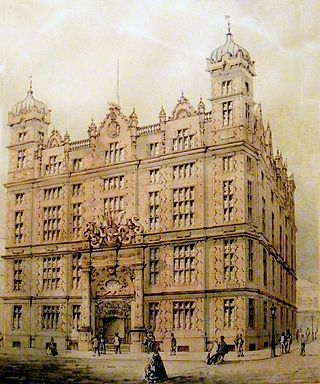
"Maggie May" is a traditional Liverpool folk song about a prostitute who robbed a "homeward bounder": a sailor coming home from a round trip.
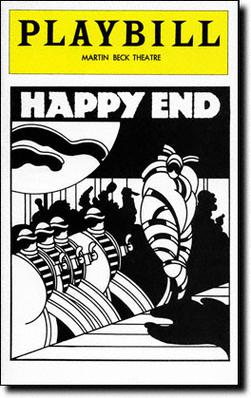
Happy End is a three-act musical comedy by Kurt Weill, Elisabeth Hauptmann, and Bertolt Brecht which first opened in Berlin at the Theater am Schiffbauerdamm on September 2, 1929. It closed after seven performances. In 1977 it premiered on Broadway, where it ran for 75 performances.

La Strada is a musical with lyrics and music by Lionel Bart, with additional lyrics by Martin Charnin and additional music by Elliot Lawrence. It is based on the 1954 film of the same name by Federico Fellini. Bart wrote the score in 1967 and made a demonstration recording, although the musical was not produced until 1969, when it was famously cancelled after just one performance. The musical's book was written by Charles K. Peck, Jr., who also produced it on Broadway.
Sally Ann Triplett is a British singer and actress. She participated in two editions of the Eurovision Song Contest and West End productions.

Maggie Flynn is a 1968 musical with a book by Morton DaCosta and music and lyrics by Hugo Peretti, Luigi Creatore, and George David Weiss.
The 1913 Sligo Dock strike in the port of Sligo in northwest Ireland was a labour dispute lasting 56 days from 8 March to 6 May 1913. During the strike, there were numerous clashes on the docks and riots in the town, resulting in one fatality. Occurring six months earlier than the Dublin Lockout, it was regarded as a precursor to that action and a successful application of the Irish Transport & General Workers Union’s strategy for workers rights by James Larkin and James Connolly. It resulted in victory for the workers. James Larkin considered the 1913 victory in Sligo to be a major achievement of the ITGWU.
